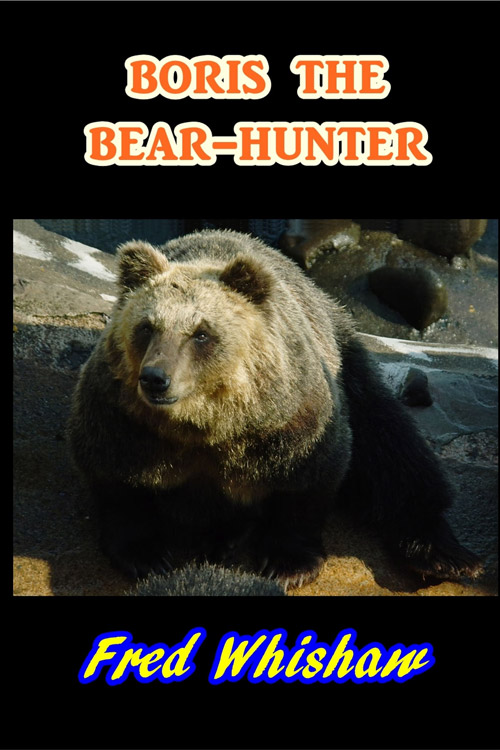
Boris the Bear-Hunter
There was no man, young or old, who could compare with this young giant for hundreds of miles around in any of those sports or competitions where the palm went to the strongest. Tall and muscular beyond his years—for he was but nineteen at this time—lithe as a willow, straight as a poplar, Boris excelled in anything that called into play the qualities of activity and strength. Had he lived in our day and attended an English public school, he would undoubtedly have come to the front, whether on the cricket or the football field, the running path, or the river.
But being debarred from the privileges of English schoolboys, Boris was obliged to expend his energies in those exercises which were open to him and which alone were familiar to the people of his country—snow-shoeing, hunting, swimming, and similar sports natural to the livers of a wild, outdoor life in a scarcely civilized land. It was early summertime, and the woods, or instead forests, about Archangel were in their fullest heyday of life and beauty. Hundreds of square miles of pine trees were the principal feature of the landscape, dotted here and there by a patch of cultivated land or watched over by a tumble-down village nestling beneath the shadow of the forest.
Oats and wheat, now fast ripening, waved in the soft air of June and told of peace and plenty for those who took the trouble to till the generous soil for a living. The prospects of the crops around Dubinka, Boris’s village, appeared, at first sight, to be promising enough—the rye was tall and nearly ripe. The oats were doing capitally, but had you asked the peasants, the owners of the crops, they would have told you, with the lamentations common to the Russian peasant, that God had indeed been very good to them and sent them a fine harvest, but that the devil had spoiled all the good work by sending two giant bears to eat up and trample down the fruits of the field, and to ruin the poor peasants.
They would have said Ivan’s field was half eaten up already, and Andrey’s would go next. And Boris couldn’t find the bears, or he would soon give them “something in their stomachs better for them than the peasants’ oats,” but there was no snow, and Boris could not track them without it, though he had been after the brutes for a fortnight and more. This was all true enough—indeed, Boris was “after them” at the present moment, though to look at him you would scarcely have thought it, for the hunter was busily engaged strolling lazily through the forest, picking and enjoying the beautiful wild strawberries which covered the ground in profusion. He had propped his bear spear against a tree and was at the moment some distance from the weapon—tempted away from it against his habit by the peculiar lusciousness of the fruit, which was warm from the sun and very delicious.
Read or download Book
Frederick Whishaw
Frederick James Whishaw was born on 14 March 1854 in Saint Petersburg, Russian Empire, to English-born parents Bernard Whishaw of Cheltenham and Isabel Maria Cattley. He was one of eight children.
Biography.
His family had been in the Russian Empire since the 18th century. Eight weeks after his birth, his parents moved the family back to Great Britain and settled in Paignton, Devon, where Whishaw would spend much of his childhood. He was educated at Leamington College and then at Uppingham, where he became an accomplished sportsman and tenor. He was also popular among his classmates for the food hampers he often received from Russia. At age 16, Whishaw left school and returned to St. Petersburg to work for an office firm. He spent much of his recreational time running and rowing. He also had a collection of verses, Loves of the Flowers, published in 1878.
Unhappy with his occupation, Whishaw left Hills & Whishaw and eventually emigrated to England after marrying Ethel Charlotte Moberly on 30 March 1880. Their first and only child, Gwendolen, was born on 13 January 1884. Returning to his childhood home of Paignton, he began a career as a musician and soon became a well-known and successful tenor. During this time, he also began translating the work of Fyodor Dostoevsky, which Henry Vizetelly published between 1886 and 1888. His efforts eventually resulted in many of Dostoevsky’s novels being made available for English-language readers in Victorian Britain for the first time.
Whishaw was soon inspired to try writing and had his semi-autobiography, Out of Doors in Tsarland: A Record of the Seeings and Doings of a Wanderer in Russia, published in 1893. A year later, he wrote his first children’s novel, Boris the Bear-Hunter, followed by ten more novels between 1895 and 1898, including his first collection of English “schoolboy” stories, Gubbins Minor and Some Other Fellows. These and other stories were published as popular serials in many boys’ adventure magazines throughout his career. His schoolboy stories were a mix of gentle humour and more serious themes of public school life, such as theft, house matches, and other everyday behaviours.
It was his Russian-themed children’s adventure stories and historical novels for which he was best known. Several of these stories took place in other parts of the world, such as colonial Africa, as seen in The White Witch of the Matabele (1897), and focused on then-current events like The Three Scouts: A Story of the Boer War (1900). Whishaw also wrote several books on Russian history, most notably the well-received Moscow: A Story of the French Invasion of 1812 in 1905. He wrote his final novel, A Bespoken Bride, in 1914, though many of his earlier stories continued to be reprinted for years afterwards. Whishaw died at his home in Slapton, Devon, on 8 July 1934.






